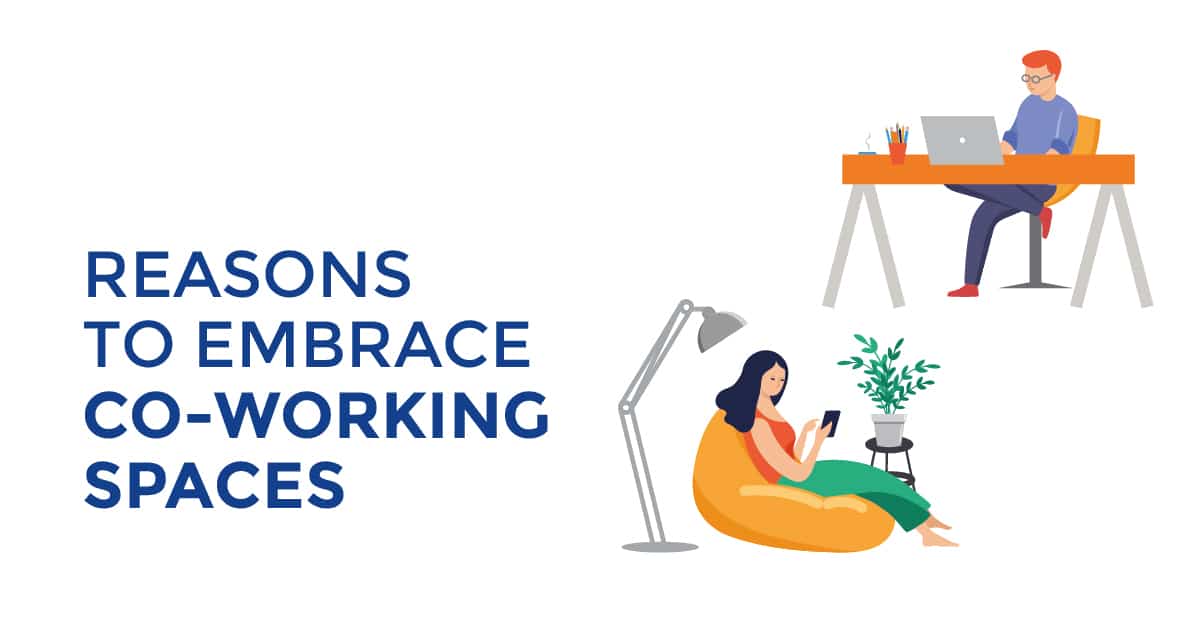The concept of co-working spaces revolves around the idea of shared working space by multiple organizations, freelancers, and other professionals. The concept first emerged around 2005 and has quickly grown popular since then.
Over time, more and more organizations are encouraging the idea of shared working spaces as it allows a more sustainable working model. According to recent statistics, there are almost 20,000 co-working spaces worldwide, and this number is expected to double by 2024, indicating an increased interest in co-working spaces despite the COVID-19 setback.
Big names in the IT industry, including IBM, Microsoft, Spotify, Pinterest, etc., have also embraced the co-working space idea, which is resulting in more co-working spaces opening up around the world.
Co-working spaces are not only good for established organizations, but it is especially beneficial for startups as it helps them save, learn, and grow. Small businesses, such as local carpet cleaning services, freelancers, and home-based businesses, can also benefit from shared work spaces as they cost less.
For the past few years, more freelancers prefer to work remotely, and co-working spaces work perfectly for such remote workers. HR always strives to ensure that employees get an environment where they are happy and comfortable, and shared workplaces may be the perfect solution.
Having a shared working space has several benefits that organizations can avail for their growth and success. Let’s have a look at a few reasons that HR should embrace co-working models.
Table of Contents
1. Happier and More Productive Employees

HR’s primary job is to make the employee experience better and take necessary measures to ensure the employee is happy and productive. The surroundings of work have a high impact on the productivity of the employees, and as per surveys, employees tend to stay more active in a co-working space.
As a co-working space is different from conventional working space, employees tend to be interactive, make friends from different fields and ages, and stay happier in such a different environment.
Not only is this good for employees but for the organization as well as the employees work with better energy and stay innovative in a dynamic and evolving atmosphere. Most of the co-working spaces are designed with a hyped-up environment, funky walls, bean bags, and other aspects to make the environment fun.
2. Expanded Skill Sets
Another positive aspect of co-working spaces is that employees interact with people from different fields and unique skill sets, which broaden their horizons and build multiple skills. In a co-working space, a diverse range of talent is sitting together working for their organizations, from a freelancer to a lawyer, a graphic designer, a research specialist, and much more; this helps people interact and learn new information.
This interaction between diverse talents helps teams learn new things every day. As per stats, 71% of people said their creativity had increased since working in a co-working while 62% said their standard of work had improved.
3. Widened Social Networks

When working in a shared working space, naturally, you tend to meet people from different backgrounds. These people aren’t restricted to one type of occupation. For example, if you are working for an IT company in a normal office, you will only meet people with an IT background. However, if you are working in a co-working space, you are likely to meet psychologists, artists, filmmakers, etc.
This is good for people to expand their social circle and get to know people other than their specific field. Networking is helpful for both your personal as well as professional lives. People also feel less lonely when working in a shared space.
People working in shared spaces have reported that they interact more and make new connections while working at a co-working space, which wouldn’t have been possible in a normal work atmosphere.
4. Increased Work Flexibility

Unlike conventional offices, co-working spaces have a relaxed environment with fewer restrictions and rules. Most co-working spaces are accessible for workers throughout the day, which gives employees more control over their working hours.
The employees can decide when they want to come and when they can leave, which makes it easier for them to manage tasks at their own pace. Unlike a normal office, there isn’t constant monitoring when an employee enters and leaves the office.
This flexibility is appreciated by co-workers, and they feel the freedom to work easily. This is an important aspect in terms of HR, as to retain your employees, it is essential to provide the working hours flexibility.
5. Better Work-Life Balance

While working from a co-working space, employees are happier and more relaxed as they can maintain a better work to life balance making sure they’re giving both aspects equal time. These co-working spaces mostly offer facilities such as gym, yoga, and medical centers, which can be enjoyed by their co-workers while maintaining their health.
This is a good aspect as HR has to manage employee benefits as well. Some of the co-working spaces also have a day-care facility so people can easily work and have their kids in the same place. These models are proving to be beneficial for employees, and HR also get attracted as there are multiple benefits.
6. Co-working Spaces are the Future

There are numerous benefits of co-working spaces, and it is evident that the co-working spaces model will flourish in the coming years. People from various sectors are coming to sit at a single place, which then becomes a stage full of opportunities and growth. More and more organizations are following the concept of embracing co-working spaces.
HR should take advantage of this facility for the expansion of their business and benefit the employees. Several multi-nationals hire people globally who can then report from a co-working space with all the facilities. These co-working spaces also help save a lot of costs for organizations as the rent is minimal and all the facilities are provided to the employees. This sustainability aspect is also a prime reason for many organizations to opt for co-working spaces globally.
Author: Arslan Hassan is an electrical engineer with a passion for writing, designing, and anything tech-related. His educational background in the technical field has given him the edge to write on many topics. He occasionally writes blog articles for Carpet Cleaning London.





